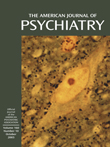Are Impairments of Action Monitoring and Executive Control True Dissociative Dysfunctions in Patients With Schizophrenia?
Abstract
OBJECTIVE: Impaired self-monitoring is considered a critical deficit of schizophrenia. The authors asked whether this is a specific and isolable impairment or is part of a global disturbance of cognitive and attentional functions. METHOD: Internal monitoring of erroneous actions, as well as three components of attentional control (conflict resolution, set switching, and preparatory attention) were assessed during performance of a single task by eight high-functioning patients with schizophrenia and eight comparison subjects. RESULTS: The patients exhibited no significant dysfunction of attentional control during task performance. In contrast, their ability to correct errors without external feedback and, by inference, to self-monitor their actions was markedly compromised. CONCLUSIONS: This finding suggests that dysfunction of self-monitoring in schizophrenia does not necessarily reflect a general decline in cognitive function but is evidence of disproportionately pronounced impairment of action monitoring, which may be mediated by a distinct subsystem within the brain’s executive attention networks.



